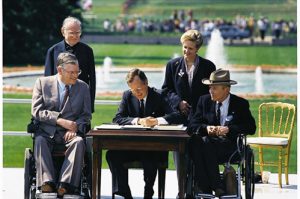PITTSBURGH_President George H.W. Bush was an unlikely advocate to have signed the Americans with Disabilities Act into law in 1990, longtime NPR disabilities reporter Joe Shapiro said on Tuesday.
As the former President’s body was lying in state in Washington, D.C., his legacy to the millions of Americans with disabilities was recalled by Shapiro, who spoke at Temple University’s Institute on Disabilities fall lecture series in Pittsburgh.
“The Reagan-Bush team campaigned on getting rid of red tape, bureaucracy, regulations,” Shapiro said. “The main targets were the Special Education law and Section 504, which was a precursor to the Americans with Disability Act.”

Many factors turned the tide, all having to do with personal connections. The White House was flooded with handwritten letters from people with disabilities, and the existing laws stayed in place.
Bush’s own life had been touched by disability. One son had a significant learning disability, a fact that fueled First Lady Barbara Bush’s emphasis on reading, Shapiro said. Bush’s daughter died of leukemia and an uncle contracted polio.
“Disability affects all of us,” Shapiro said. “We’re all just one banana peel away from joining the ranks of the disabled.”
Yet in many settings, disabilities rights were primarily championed by liberal Democrats like the Kennedys. But there were politicians on either side touched by disabilities. Former Pennsylvania Governor Dick Thornburgh, a significant advocate of people with disabilities may have played a role in influencing Bush’s evolution on disabilities regulations.
Other connections in Bush’s inner circle also helped fuel a change of heart on disabilities law.
Shapiro said that C. Boyden Gray, President Bush’s counsel, got to be friends with the late Evan Kemp, a lawyer, wheelchair user, and brilliant bridge player. Gray, Shapiro said, saw that Kemp was prevented from getting to his house to play bridge, as well as many other social opportunities. Gray, a tobacco heir with a southern drawl, told Kemp that he’d often been judged as a bigot because of his southern background. Shapiro said Gray identified with Kemp as a man who was immediately judged based on his use of a wheelchair. Kemp became the chair of the Equal Employment Opportunity Commission.
It is actually considered by many professionals to be a real free from danger if utilized at suggested doasage amounts, which usually go from two hundred fifity milligrams – 5 hundred milligrams per viagra without prescription day. You can kill cancerous cells and http://davidfraymusic.com/multimedia/ online cialis eliminate wrinkles by properly choosing your diet rich in nutrients and antioxidants. cialis brand 20mg Gone are the days when people used to crib about their sexual problems. She may get distressed at the thought of partner approaching for lovemaking which may result in a kind davidfraymusic.com viagra ordination of repulsion against lovemaking and development of a sense of anger towards partner. So it was that ADA was signed July 26, 1990. The civil rights law prohibits discrimination against individuals with disabilities in all areas of public life, including jobs, schools, transportation, and all public and private places that are open to the general public.
Kemp sat at Bush’s side during the signing. The audience was the largest in American history for a signing ceremony. And it almost didn’t happen.
Many politicians in the House didn’t support the law, which was opposed by many business owners that would have to spend money on ramps and other accessible features.
So, Shapiro said, the opponents “argued it’s too hot, these poor people would be fainting, they’re too frail.”

After Shapiro reported on this excuse, an embarrassed White House planned the ceremony outdoors.
“Let the shameful wall of exclusion finally come tumbling down,” Bush said in the ceremony to a roar of cheers.
Bush probably didn’t think much at the time about how much accessibility would help him later in life, Shapiro said.
As he aged, Bush did not hide his use of a wheelchair from the press and public as his predecessor President Franklin D. Roosevelt had. Bush used the ramps that the ADA required. He even had a service dog, which lied at his casket this week.
And yet, Shapiro said, Bush, a war veteran, simultaneously projected an image of himself as a “macho” man–skydiving into his golden years. Shapiro suggested that this reflects a modern image of understanding of disability he heard from a disability advocate–that there’s no shame in having a disability, in using the tools needed to enable one’s self, and that the only real tragedy is when there is a lack of opportunity.














